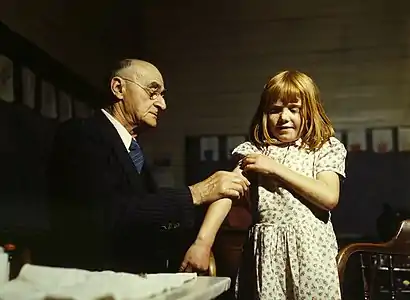Vaccination Week In The Americas
Vaccination Week In The Americas (VWA) is an annual public health campaign by the member states of the Pan American Health Organization (PAHO) to promote equity and access to immunization.[1] It is marked each year during the last week of April.[2]
| Immunization Week in the Americas | |
|---|---|
| Observed by | All member states of the Pan American Health Organization |
| Date | Last week of April |
| Frequency | annual |
Since 2012, the campaign has been celebrated globally across all regions of the World Health Organization (WHO) under World Immunization Week. The WHO reports there are 25 diseases for which vaccines exist for their prevention and control.[3]
History
VWA was initially proposed and implemented on April 23, 2002, under the presidency of Dr. Patricio Jamriska, Secretary of Health of the Republic of Ecuador and by the Ministers of Health in the Andean Region following a measles outbreak in Venezuela and Colombia.[2] Originally endorsed through the adoption of Resolution CD44.R by the Directing Council of the Pan American Health Organization (PAHO), the overarching objectives of VWA are to promote equity and access to immunization and strengthen immunization programs in the Region of the Americas by “reaching the unreached”, populations with otherwise limited access to regular health services and at heightened risk of contracting vaccine-preventable diseases. In the Americas, such populations can be found in areas such as urban fringes, low coverage municipalities, indigenous communities and rural and/or border zones.[4]
VWA has been used to conduct large-scale vaccination campaigns, introduce new vaccines, carry out communication and social mobilization campaigns, and to integrate other health promotion measures.[1][5] Since its launch in 2003, over 365 million individuals have been vaccinated through campaigns conducted under the framework of the initiative.[6]
In April 2012, PAHO joined the other five WHO regions to celebrate World Immunization Week. This followed the launch of European Immunization Week (EIW) in the WHO European region in 2005, and Vaccination Week campaigns launched in the WHO Eastern Mediterranean region in 2010, and in the WHO African and Western Pacific regions in 2011. The member states of the WHO South-East Asian region committed to the annual campaign in 2012.
Themes
The goals and activities for each VWA are chosen in accordance with a specific theme, and adapted in alignment with national health objectives.[7]
2014
The twelfth VWA takes place from 26 April to 3 May 2014, with the regional slogan: “Vaccination: Your best shot.” This slogan was chosen to encourage people to protect themselves and their communities against the importation of polio, measles and other vaccine-preventable diseases, in the context of the upcoming 2014 FIFA World Cup in Brazil.[8]
2013
VWA 2013 was marked from 20 to 27 April, with the regional slogan: “Vaccination: a shared responsibility.”[9]
2012
The tenth annual VWA was held on 21–28 April 2012, giving public health organizations across the region another opportunity to advance efforts in childhood immunizations.[7][10]
2011
The ninth annual VWA was celebrated during 23–30 April 2011 under the slogan "Vaccinate your family, protect your community".[11] Over 41 million individuals were vaccinated as a result of the 2011 VWA initiative.[6] Regional events for VWA 2011 were held across large cities and small towns, and on bi- and tri-national borders across the region, including the Altiplano between Peru and Bolivia, and the Amazon Basin subregions.
2010
Events for VWA 2010, which was celebrated from 24 April to 1 May 2010, targeted regional vaccination goals to reach children under 5 years of age, pregnant women, elderly populations, border and isolated populations, indigenous populations, and low coverage municipalities.[12]
2009
The seventh annual VWA took place from 25 April-2 May 2009. Themes emphasized during this VWA included the importance of family vaccination as well as the vaccination of health workers.[2]
References
- "Vaccination Week In The Americas: An Opportunity to Integrate Other Health Services With Immunization" (PDF). Journal of Infectious Diseases. 2012. Retrieved 2009-02-07.
- "History of Vaccination Week in the Americas". Pan American Health Organization. 2009. Retrieved 2009-04-29.
- World Health Organization, Global Vaccine Action Plan 2011-2020. Geneva, 2012.
- "Vaccination Week In The Americas (2009 portal)". Pan American Health Organization. 2009. Retrieved 2009-04-29.
- "VWA 2008 Final Report" (PDF). Pan American Health Organization. 2008. Retrieved 2009-04-29.
- "VWA 2011 Final Report" (PDF). Pan American Health Organization. 2011. Retrieved 2012-01-23.
- "Vaccination Week in the Americas Goes Global". Global Health Magazine. 2012. Retrieved 2012-01-24.
- PAHO, Vaccination Week in the Americas. Accessed 14 April 2014.
- Cayman Islands Government, Vaccination Week in the Americas Fact Sheet — 2013. Accessed 14 April 2014.
- United States-Mexico Border Health Commission, 2012 National Infant Immunization Week / Vaccination Week in the Americas. Accessed 14 April 2014.
- "Cayman Islands Government Message for Vaccination Week in the Americas 2011". Cayman Islands Government Website. 2011. Retrieved 2012-01-29.
- World Health Organization, Immunization week to kick off in 112 countries. Accessed 14 April 2014.
External links
- Vaccination Week in the Americas
- United States-Mexico Border Health Commission: National Infant Immunization Week/Vaccination Week in the Americas
- Immunize Canada: National Immunization Awareness Week
- Vaccination Week in the WHO Eastern Mediterranean region
- African Vaccination Week
- Vaccination Week in the WHO Western Pacific region
- Andinos se unen para luchar juntos contra malaria, dengue y sida
- Sucre Agreement
- Boletin Informativo PAI
- Convocatoria a Reunion Extraordinaria de Ministros de Salud del Area Andina
- Reunion Extraordinaria de Ministros de Salud del Area Andina
